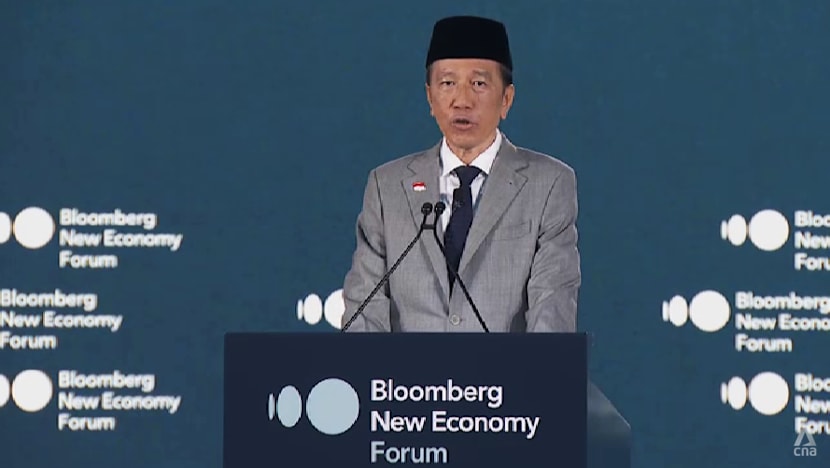‚ÄėJob opportunities will come‚Äô: Leaders must prepare workers for intelligent economy, says Jokowi
Joko Widodo reflected on Indonesia's infrastructure growth during his decade-long tenure as president and discussed adapting to an era of advanced technology, during an interview with ¬ť∂Ļ's Roland Lim.

Former Indonesian President Joko ‚ÄúJokowi‚ÄĚ Widodo gives the closing address at the Bloomberg New Economy Forum in Singapore.

This audio is generated by an AI tool.
SINGAPORE: Former Indonesian president Joko ‚ÄúJokowi‚ÄĚ Widodo has called on governments and global institutions to redefine their political and financial systems for the ‚Äúintelligent economy‚ÄĚ.
Delivering the closing speech at Bloomberg’s New Economy Forum in Singapore on Friday (Nov 21), Widodo stressed that strong infrastructure is the backbone of an intelligent economy, as it enables connectivity, data flow and technological integration.
Speaking about Indonesia’s transformation over the past decade, the 64-year-old underscored how infrastructure investment became the foundation of his nation’s economic strategy.
‚ÄúWe built roads, seaports, airports, power plants. Because without strong infrastructure, the economy cannot grow,‚ÄĚ said Widodo, who was president from 2014 to 2024.
‚ÄúIndonesia has also made great progress in digital infrastructure ‚Äď building data centres, launching new satellites, expanding digital networks and improving connectivity across the nation.‚ÄĚ
LAYING FOUNDATIONS FOR A DIGITAL FUTURE
Widodo said Indonesia is now ‚Äúready for the next stage‚ÄĚ ‚Äď the intelligent economy era, which leverages advanced technologies, artificial intelligence, data and information.
‚ÄúData (is) not just power, it‚Äôs capital. It defines competitiveness and national strength,‚ÄĚ he said, emphasising that digital readiness and human capital are crucial to sustaining progress.
Governments, he added, have a duty to ensure their populations are digitally literate and ready for the new job opportunities that will emerge.
‚ÄúThe intelligent economy is not only about technology, it‚Äôs also about preparing people,‚ÄĚ he told ¬ť∂Ļ on the sidelines of the forum.
‚ÄúIt‚Äôs our responsibility to train them ‚Ķ to understand AI, to know coding, algorithms, machine learning. They must have good digital literacy and skills,‚ÄĚ he added.
‚ÄúAfter that, the job opportunities will come.‚ÄĚ
SUPPORTIVE ECOSYSTEM FOR INNOVATION
Widodo underlined the importance of regulation and fostering an ecosystem to support private sector growth.
He credited Indonesia‚Äôs startup success stories ‚Äď including Gojek, Tokopedia and Traveloka ‚Äď to government policies that encouraged innovation and entrepreneurship.
‚ÄúWhen the government builds the right foundations, innovation will follow,‚ÄĚ he said.
Widodo warned, however, that existing global systems are becoming outdated.
He urged international institutions such as the International Monetary Fund (IMF), World Bank and World Trade Organization (WTO) to modernise their frameworks.
‚ÄúIn this new era, companies, industries, private sector, almost all of them will use AI,‚ÄĚ he said.
‚ÄúThat means we must redefine our processes, our systems, our strategies ‚Ķ so we can grow faster ‚Ķ to get better economic growth, better life for the people.‚ÄĚ
SOUTHEAST ASIA & THE AI REVOLUTION
Looking beyond Indonesia, Widodo described Southeast Asia as a ‚Äúglobal force‚ÄĚ in the making.
He noted that an increasing number of young entrepreneurs are building startups and small businesses are moving online, positioning the region as an emerging innovation hub.
‚ÄúSoutheast Asia is no longer just a market; it is becoming a global force,‚ÄĚ he said. ‚ÄúThe next unicorn may not come from Silicon Valley or Shenzhen ‚ÄĒ it may come from Jakarta, Singapore, Bangkok, Kuala Lumpur, Manila or Hanoi.‚ÄĚ
Widodo concluded the interview with a call to prepare for the coming wave of AI and robotics.
‚ÄúI believe that in the next five to 15 years ‚Ķ there will be a big humanoid robotic revolution (and) a big AI revolution,‚ÄĚ he said. ‚ÄúSo, we must prepare from now.‚ÄĚ
He said that with the right foundations ‚Äď infrastructure, policies, education and cooperation ‚Äď Indonesia and Southeast Asia can thrive in the new age of the intelligent economy.











